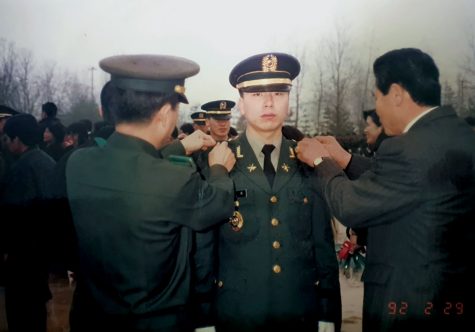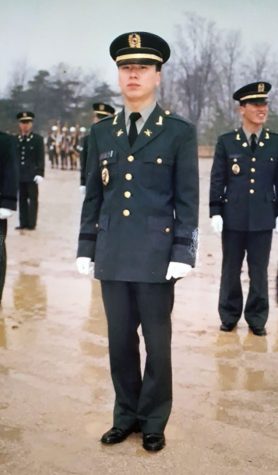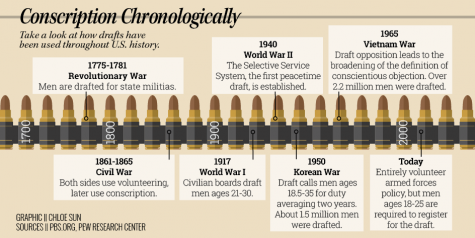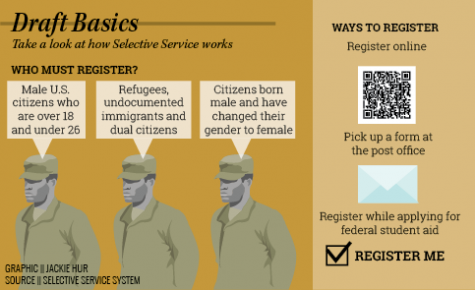A Duty to Serve
CHS students, faculty discuss mandatory military service, concept of drafting
Senior Noah Sim is a Korean citizen. That means between the ages of 18 to 28, he is required to return to South Korea and complete two years of compulsory military service.
“I suppose (I’m okay with compulsory military service). Why not? It’s my country, it’s important to me, and these days, I hear that the experience isn’t that bad,” Sim said. “It would be good character building.”
South Korea is not the only country that requires military service from its citizens; in fact, 26 other countries have some form of compulsory military service, though factors such as length of service and gender requirements differ.

Sim’s father, Young Dong Sim, being decorated for his service in the South Korean military. He served two years in ROTC and two years four months in the military, gaining the rank of first lieutenant.
However, South Korea’s government has faced controversy in regard to its mandatory military service. According to a law enacted in 1973, men who have “raised the national image on a global stage and enriched the culture and sports sectors” are allowed to avoid military conscription. As of May, 449 people have qualified for the exemption on those grounds. Some people challenge that exemption of athletes and other artists is unfair to normal, everyday people, while others claim that mandatory military service itself should be abolished.
Senior Kian Robinson is someone who disagrees with the concept of mandatory military service and the draft. As an 18-year-old male, he was required by law to register in the U.S. Selective Service System. While Selective Service is only a contingency mechanism, it allows the possibility that young men could be conscripted to serve in the military.
“I generally disagree with (the concept of a draft),” Robinson said. “From a more ideological standpoint, forcing people to fight when they don’t want to is just something I’m not a fan of.”
Robinson is not alone. According to a Gallup poll conducted in 2017 where 1,006 adults aged 18 and older living in all 50 U.S. states and the District of Columbia were surveyed, 57% of people under the age of 30, the group most likely to be affected, said they opposed the idea of mandatory military service.
Mandatory military service in the United States has been a point of contention for many years. However, Peter O’Hara, retired lieutenant colonel (LTC) and social studies teacher, said he agrees with the fundamental concept of the draft and he believes it is constitutional. Despite that, O’Hara said he believes the draft has become obsolete and can no longer be implemented.
“The draft is an antique method of getting people to serve in a time of crisis to protect the country. And while it’s certainly constitutional, here’s the problem: While there is a draft law, it’s almost impossible to have a major draft,” O’Hara said. “You could draft a small amount of people if necessary, but to have a massive draft, the infrastructure and the money doesn’t exist to train, equip and deploy that massive amount of people that would come in if you had a draft. We just don’t have the ability to do that.”
For his part, Sim said he believes it is his duty to complete his service in South Korea.

“It’s a good thing to do and everyone does it,” Sim said. “I was interested in the Air Force (and maybe would’ve joined voluntarily), but I have other interests and aspirations that would make it difficult to serve.”
Robinson, on the other hand, said he disagreed.
“I signed up for Selective Service because I turned 18 and I had to do it. But I would never join the military voluntarily. If I were drafted, I would likely be a conscientious objector because I’m not going to participate in military activity,” Robinson said. “It’s not necessarily dodging, because I have deep-seated ethical issues with military activity. If I truly didn’t believe in helping out the war effort, I would have serious hang-ups on participating in it. I might not dodge it, but I might take jail time over helping out a war I don’t agree with.”
Many Americans share the same sentiment as Robinson. The United States has employed a draft several times and has been met with resistance each time. In wars such as the Civil War and World War I, hundreds of people evaded the draft, coining the term “draft dodgers.” The Vietnam War was especially controversial in the United States and was accompanied by a significant amount of draft evasion by young Americans by various means. Some eventually fled to Canada to dodge the draft.
However, as technology has changed warfare, O’Hara said he believes the draft will no longer be able to be implemented, hypothetically or not.
“Warfare has changed. Things are fast today. It takes a lot longer to train a soldier or airman or sailor today than it did when we first instituted the draft. Because of technology, the way we fight wars today, it’s much more complicated. By the time (you’ve notified) everyone, got them from home, got them signed into a center and trained, it would be too late,” O’Hara said. “If we were to exponentially increase the size of the military in massive numbers, there’s no infrastructure, there’s no facilities to support that. There’s also no money to do that. We don’t have the weapons, we don’t have the uniforms, we don’t have the food. The whole argument of, ‘Should we have a draft?’ kind of doesn’t matter because you can’t do what people think of when you think of ‘draft.’”

Robinson said he believed that even if the United States were to implement a hypothetical draft, history would most likely repeat itself through civil unrest and riots.
“Going back to what you see historically in the ‘60s, you would probably see a lot more civil unrest especially if the war was an unpopular one. It definitely depends on the war because I believe we had the draft in World War II and we did not necessarily see civil unrest because we were dedicated to the war cause, which in my opinion, was probably necessary,” Robinson said. “For Vietnam, you can say a lot less in that regard. So I think if there wasn’t a lot of popular support for the war, there would be huge levels of civil unrest, lack of support for the government, a lot of party-switching would happen.”
O’Hara said he agreed that reactions to a hypothetical draft would be case-by-case.
“I think it was absolutely fine (to have a draft) in World War II. Vietnam is more controversial. But if there was the type of conflict that would require enough people to have a draft, I believe that the people of the United States would overwhelmingly commit to the war. People would sign up,” O’Hara said. “There are some people who would balk at military service but if it was that necessary, I think people would support it overwhelmingly.”
For Sim, he said his mandatory military service is nothing special and shouldn’t be a source of controversy.
Sim said, “Korea has only recently achieved independence in the modern age and the mandatory military service has always been a thing. I feel like Americans tend to view the draft as something scary especially with the Vietnam War and Korean War in the military history of the United States. In reality, everyone goes through it. Ultimately, it comes down to the fact that I believe it is my duty to serve and protect my country.”
Editor’s note: In the print version of the publication, there was an error in the spelling of Young Dong Sim’s name. This has been corrected in the post. We apologize again for this mistake.


